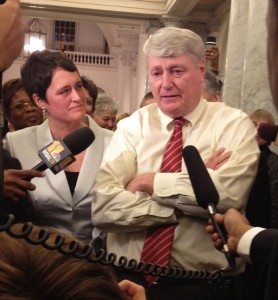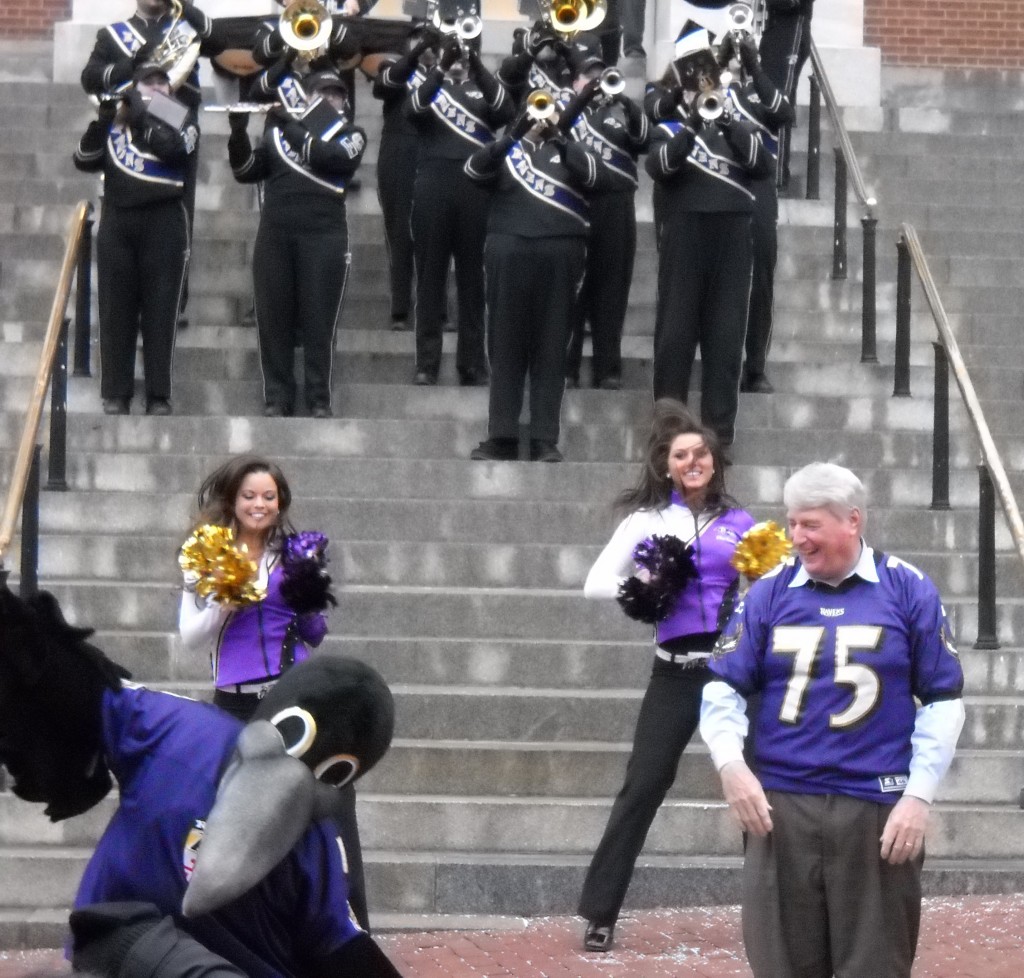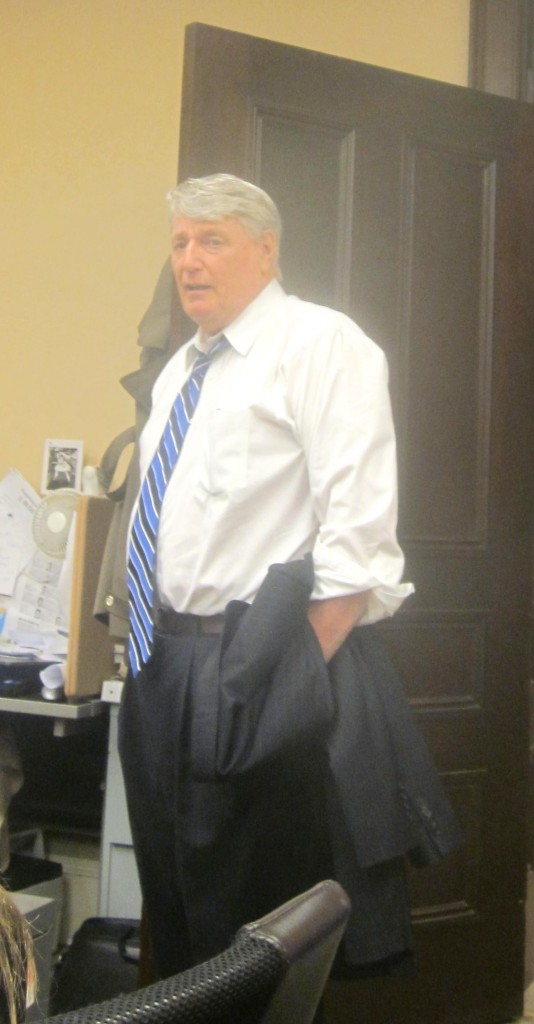Coach Busch: Profile of the powerful House speaker as hometown family man
This feature profile of House Speaker Michael Busch is running in the May issue of the regional magazines What’s Up Annapolis and What’s Up Eastern Shore that are being mailed this week. It was written in February.
By Len Lazarick
Shortly before the House of Delegates began the final debate leading up to its historic vote to approve same-sex marriage in Maryland, Speaker Mike Busch made one of his routine stops into the press room downstairs from his corner office in the State House. Most of the reporters had already left to claim a seat in the crowded House chamber above.
Usually the speaker is an almost daily visitor to the press quarters, bantering with the scribes, razzing some of the old-timers, and even, on occasion, giving a rendition of the poem “Casey at the Bat.” When asked a question on the record, he switches into his “speaker” voice, a precisely worded monotone that seldom goes off message—unlike the daily post-session media gaggles on the steps of the Senate rostrum by Senate President Mike Miller that often produce news. Of the two Mikes, Busch actually seems to like the company of reporters.
In the days leading up to the vote, Busch had been fairly scarce in the press quarters, preoccupied with rounding up votes to support a measure to which he had been a late convert. But that late afternoon, Busch looked relaxed, confident, and clearly in charge of the situation. He expected a close but positive vote after a debate that would allow him to make the 8 p.m. dinner reservation at Café Normandie for his wife Cindy’s birthday.
Three hours later, after the razor thin 72-67 vote, a teary-eyed Busch was in the State House lobby, being hugged and kissed by the delegates he leads, surrounded by celebrating gays, talking to reporters about what some call the civil rights vote of his generation. (He would then head over to Main Street to meet Cindy and his two daughters for the birthday celebration.) As he described it in an interview later, “the place was rockin’.”

An emotional Speaker of the House Michael Busch speaks to reporters after the same-sex marriage bill passes the House with a 72-67 vote, while Del. Heather Mizeur looks on.
Powerful pol and hometown family man
The story illustrates two key aspects of Busch. As the longest serving speaker in Maryland history, he shares immense power with the governor. He is also a hometown family man who lives in a modest house on McKendree Avenue in the Homewood section of Annapolis and knows thousands of residents of the capital city from a quarter-century of knocking on their doors in election campaigns.
The power of the speaker of the House as leader of an overwhelming Democratic majority is real. He controls every appointment to every committee, including those for the Republican minority, he manages the flow of legislation and appoints people to major boards and commission. But the trappings of power are fairly modest. The Honorable Michael Erin Busch has a large corner office with a view of the governor’s mansion, a small personal staff, a parking spot on State Circle, a state trooper who acts as both guard and driver of a Crown Vic when he wants it.
Annapolis resident Mike Busch is a graduate of St. Mary’s High School on Duke of Gloucester Street, a former history teacher and football coach there. He lives in a gray-shingled single family house with three small bedrooms his wife and two daughters complain about. He works a full-time job as assistant to the director of recreation and parks (where he’s been for 32 years), and coaches his daughters’ basketball and lacrosse teams. At home, he is not “Mr. Speaker” as he is addressed dozens of times each day. “Sometimes they think I’m just the ATM in the corner,” he says.
Unlike other legislators who live afar and a stay in Annapolis hotels and rental properties during the 90-day session, Busch does not get wrapped up in the ceaseless receptions and posh dinners at high-end steak houses. Most nights he heads the mile and a half home for dinner, and most mornings he drives Erin and Megan to school, even during session.
“The benefit is you don’t have to go far, you get to see your family and participate in things,” Busch says. “The downside is you never get away from it.”
The family and the sports keep him grounded, as they’ve done for 50 years. The shelves in his office are not packed with photos of him and important politicos, but include several with Coach Busch and his daughters’ teams. There’s also a black- and-white photo of a skinny, nearly unrecognizable Busch and other high school players with star Naval Academy quarterback Roger Staubach the year he won the Heisman trophy.

In January 2011, Busch donned a Ravens jersey for a rally at the State House as the team headed to the playoffs.
Football star
Busch can produce an old fashioned scrapbook with yellowing newspaper clips of his high school career and then that “fairy tale” sophomore year at Temple University. Recruited there with the help of the Navy coach, after a place on the University of Maryland roster fell through, the star running back set a rushing record and helped the university win its first division title, a feat not matched since. Busch injured his knee in junior year, ending any chance of a pro football career.
He came back home with a history degree, and a nun at St. Mary’s brought him back to coach basketball, then football, and teach history. “I love coaching and I loved teaching history.” He started working for the county organizing youth sports and has stayed involved in youth athletics as organizer and referee. He said it was a great preparation for what he does now as speaker. In both team sports and the legislature, “you try to incentivize them, try to make them feel they are part of the overall plan, and then motivate them in the direction to try to accomplish it,” even asking people to do things they don’t like for the team.
Urged into politics
Busch said it was parents of his students and young athletes who encouraged him to run for office. The coach hadn’t been politically active, though he knew some politicians. “I’d been around it, but I never thought I’d have an interest in running for office.”
It was a different era, he recalls. There was no negative campaigning, and the emphasis was on public service.
His longtime friend, and a man Busch calls his political “soul mate,” Sen. John Astle says Busch “has another ability that is unique.”
“Mike can look at a group of people and see their strengths and weaknesses,” and assess how to use them to get something done, Astle says.
Astle was the top vote getter in the race for delegate that Busch lost in 1982. In 1986, when two seats opened up, Busch suggested they would do better running as a team, and they have ever since.
“He’s a great guy. I would trust him with my life,” Astle says, even though, “we don’t always agree on issues.” Those include big issues like gay marriage and tax hikes, where Busch is corralling votes for the measures and the more conservative Astle is voting against them.
Highly competitive from a young age, Busch is also intensely interested in winning. Even 35 years later, Busch recalls that as St. Mary’s High football coach, “I have the highest winning percentage of any coach that’s been there four years.”
The opposing team
Even Busch’s Republican opponents call him a nice guy, but they have no doubt he’s the coach of the opposing team, not afraid to call any number of plays against them.
“In reality, he doesn’t need a single Republican vote to get anything done,” says Del. Bob Costa. Last year, when Republican delegates won control of the Anne Arundel delegation in the House, Costa became chair.
“I was apprehensive of what the speaker’s impact would be on the delegation,” Costa said. As the term began, he would get messages after morning session that the speaker wanted to see him. “It was like being sent to the principal’s office.”
“You take his recommendations very seriously,” Costa said.
Del. Cathy Vitale knows Busch as a member of the County Council for 11 years. They both represented a part of Broadneck.
“He was receptive to parks issues,” Vitale says about Busch in the county job. But then she recalls one of their first conversations on an Anne Arundel political issue after she was elected to the House in 2010. She asked him whether this was a “Mike and Cathy” conversation, or was it “The Speaker and Delegate Vitale.” It turned into the latter.
At the orientation for the newly elected freshman delegates in the House chamber, Vitale said she saw a different side of Busch. He reminded the freshmen of how few people had sat in their chairs, and how many Marylanders they were representing. He asked the newbies to “stop and think about that responsibility.”
“I think Mike Busch has realized he has the ability and power to direct what happens in this state more than the governor,” Vitale said. “The question is what you do with that power.”
Busch photos as a player and coach.

MarylandReporter.com is a daily news website produced by journalists committed to making state government as open, transparent, accountable and responsive as possible – in deed, not just in promise. We believe the people who pay for this government are entitled to have their money spent in an efficient and effective way, and that they are entitled to keep as much of their hard-earned dollars as they possibly can.

